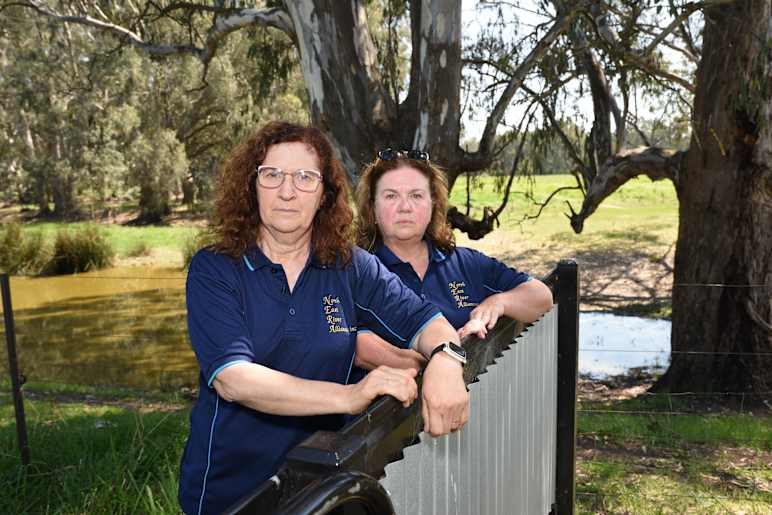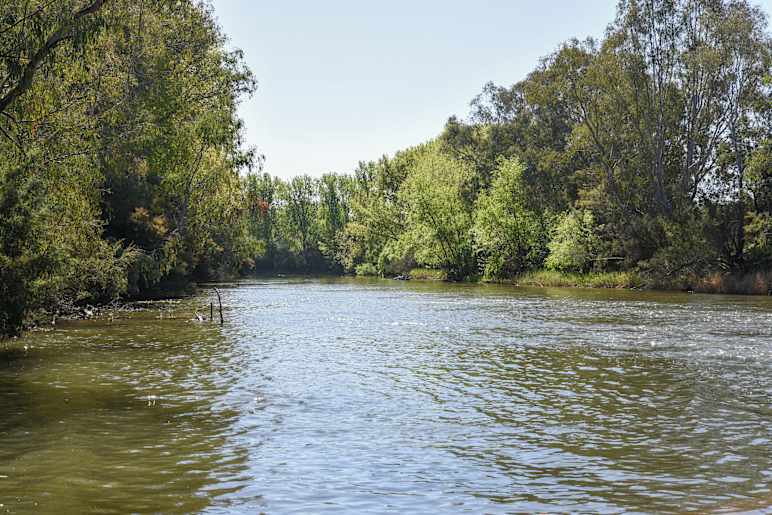RESIDENTS on the Ovens River in Markwood are waiting for the North East Catchment Management Authority (NECMA) to address problems of erosion which they say it promised to do over 20 years ago.
Heather and Terry Greaves live on a 162acre property along the Pioneer Reach of the mid-Ovens River, upstream of Wangaratta - a stretch which suffered a major river outbreak in 2016 following public works undertaken by NECMA as part of the Markwood Deep Creek Management Scheme.
They say the flow in the Ovens River increased significantly following the works which included blocking off the Tea Garden Creek, the construction of a new levee, raising two spillways, blocking the Pioneer Break and the recent reconstruction of one of the Deep Creek outbreak spillways, which was mistakenly made 300mm higher than it should have been.
Mrs Greaves is the president of the North East Rivers Alliance which was formed by landholders in 2017 due to frustration with NECMA's inaction after the river outbreak in Markwood, that created a new river anabranch dissecting properties for 11.5km between Markwood and Tarrawingee.
She said more than 50 landholders are affected on the same side and stretch of river between Pioneer Bridges and Tarrawingee Bridge, with more than 100 people signing a survey saying they had been impacted by increased flooding of their property and roads since the works took place.
Latest Stories
"When it rains significantly, we check the gauge at Rocky Point and we know for a fact we're getting way more water here - we're getting what we would see in a moderate flood when it's below minor flood in the river - which is not right," she said.
"And we know we live on a flood plain - we keep telling them that we know to expect some flood water - but the fact is, it has increased significantly."
Ms Greaves said landholders feel they have been "fobbed off" by NECMA, who she says appear to have enough money to engage consultants and commission reports, but not to fix the problems.
"They are called the North East Catchment Management Authority, but they're not doing any management - or it's very minimal - and it's also reactive management," she said.
"They're waiting until riverbanks blow out before they fix things - we tell them that the bank is threatening to blow out and they say they haven't got any funding to stop it."
Mrs Greaves said this section of the Ovens River is quite unique in that it has been "engineered and fiddled with over many, many years".
She said she has had site visits by NECMA, there have been community meetings, countless studies had been conducted, but little or no actions has been taken.
"We know what happened here in 1993 - that was a major flood - and we are just concerned that we will have much more flooding if these bank issues aren't addressed," she said.
"We're just trying to protect our assets - our houses, our paddocks, our access to stock - which can be cut off by floodwater for up to 12 weeks, which is a long time to have cattle stranded, and that happens to several landholders on this side of the river."
Mrs Greaves said at one point, NECMA removed black willows and poplars - planted over 40 years ago to hold the banks together - because it said they were not good for the quality of water and the fish population, but due to a lack of funding, they did not re-plant and the banks eroded away.
She said another major issue has been NECMA's decision to replace a bank with a spillway which they chose to lower this time by 400mm, despite the pleas of the community at a public meeting who overwhelmingly called for it to be put back up to the level the bank was before.
Following protracted negotiations running over two years, NECMA agreed to compromise and raise it by 300mm, but it still hasn't been done.
"We were happy it was going to be fixed, but that was back in June, and nothing has been done," Mrs Greaves said.
"It's October now and every time we talk to them, they keep on lengthening out the timeframe.
"It was going to be fixed in the winter, and now they are saying it will be December and I'm really starting to wonder if they really do mean to fix it."
On behalf of the North East Rivers Alliance, Mrs Greaves has contacted Minister for Water Harriet Shing for help, along with a NECMA CEO Katie Warner, supplying detailed information on the issues.
She also contacted Ovens Valley MP Tim McCurdy (Opposition Spokesperson on Water), who was on site with landholders and NECMA representatives two years ago when the authority agreed to fix the spillway.
She said her frustration was compounded by the fact she has a copy of a letter from then Minister for Environment and Conservation, Sherryl Garbutt dated May 2000, saying NECMA would "..manage stream erosion processes as part of its ongoing floodplain and water management functions" following the Markwood Deep Creek Management Scheme reconstruction on the Ovens River.
"They shouldn't be called North East Catchment Management - they should just be called North East Catchment - that's the nitty gritty of it," said Mrs Greaves.
"They spend hundreds of thousands of dollars getting reports done by consultants, that can be 30 to 100 pages long, and none of them are coming up with anything different - they're all the same.
"At the end of the day, they actually said that they would fix our spillway issue, but we're still waiting.
"And we've got another bank that's threatening to break out and needs urgent attention, because you just don't know what's around the corner with the weather.
"They can't just say 'we have to let the river go where it wants to go' because they are the ones who have manipulated that section of the river over many years, so they are the ones who need to be maintaining it."
*
NECMA says correct technical information key to addressing issues in complex Ovens system
IN response to questions over the issues raised in relation to the Markwood Deep Creek Management Scheme, the North East Catchment Management Authority (NECMA) said it has engaged local consulting firm, Water Technology, to undertake a detailed review and analysis of the current geomorphic and floodplain condition, interactions, characteristics and behaviour, and management arrangements for the Ovens River and adjoining floodplain network from the Whorouly Creek – Ovens River confluence to the Hodgsons Creek – Ovens River confluence at Tarrawingee.
It says this stretch of river is complex and has a rich history of river management with both flooding and erosion associated with developing floodplain flow paths - changes in channel size and alignment being a major focus of past interventions.
"The North East CMA values landholder input and has established a Project Steering Group with landholder representatives from both sides of the river, Goulburn Murray Water and Rural City of Wangaratta to provide strategic guidance on the community engagement approach, identify locations of areas of concern, ensure all stakeholder views are considered and to oversee the project deliverables," a NECMA spokesperson said.
"This group has been meeting regularly since the study commenced and will continue to meet as a group to provide input into management decisions and engagement in this reach.
"The review has taken longer than anticipated due to the complexity of the system and the need to ensure the technical information is correct.
"The draft report is currently being reviewed by the Project Steering Group and will be released – with public information sessions in November."
NECMA says the assessment and design of the proposal to raise the height of the Markwood spillway (a repair to a breach of the Ovens River in 2016) has been a component of this project that has required significant discussion among landholders on both sides of the river and careful design consideration.
Works are proposed to be completed by the end of the calendar year.
Landholders can find out more by visiting necma.vic.gov.au/Waterways/Markwood-Ovens-River-Complex.
*
State supporting NECMA with river challenges: Minister
THE office of Minister for Water Harriet Shing confirmed it was in receipt of correspondence from the North East River Alliance and will respond in due course.
It said the Parliamentary Inquiry into the 2022 Flood Event also provided recommendations on the management of waterways and floodplains in North East Victoria and the State Government will provide a formal response to the inquiry’s final report in early 2025.
“We're supporting NECMA as it works through the challenges of managing a dynamic river system that's been impacted by more frequent and extreme flooding, this includes working with communities to develop a targeted works program along the floodplains," a Victorian Government spokesperson said.
"We've invested $248 million over the next four years to help care for waterways and catchments in regional Victoria and continue to look at ways we safeguard our river systems into the future."
The office of Minister for Water said NECMA has specific responsibilities under the Victorian Water Act 1989 including developing and delivering a Regional Waterway Strategy which will provide long-term management programs for all waterways within North East Victoria, including the Ovens and King rivers.
While the existing Regional Waterway Strategy was developed with community in 2014, a new strategy is currently being developed and is expected to be completed by 2027.
*
Room for improvement, says McCurdy
MEMBER for Ovens Valley Tim McCurdy MP said he has been contacted numerous times by concerned locals about the lack or delay in river management in the North East.
He said he was aware of the issue in Markwood and the concerns of locals, and he continued to keep across the information he was given.
"The role of catchment management bodies in Victoria does need to be looked at, including the scope of their work and any potential improvements that can be made," he said.
"As the Shadow Minister for Water, I keep a close eye on what can be improved and what is working well.
"Currently catchment management do a great job dealing with fish ladders and other environmental improvements, particularly given the limited funding from the Labor Government which has impacted their ability to manage the catchment effectively.
"That being said there is still plenty of room for improvement, particularly with respect to riverbank erosion and fallen trees blocking up the rivers."
*
















